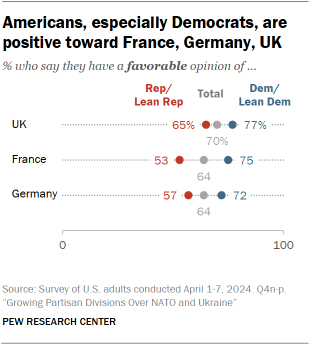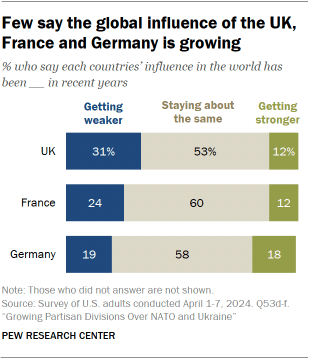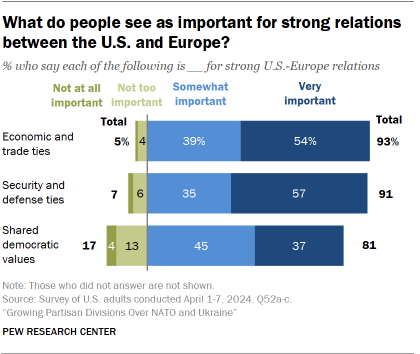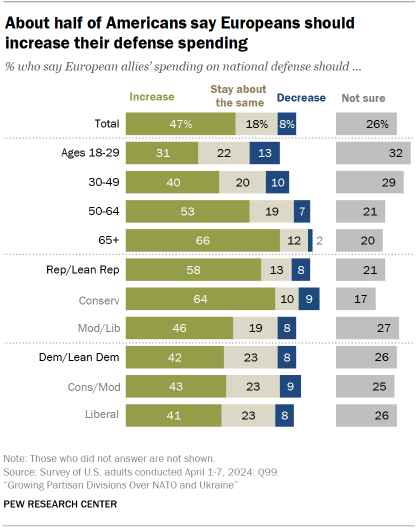Here are key takeaways regarding U.S. views of European countries, relations between the U.S. and Europe, and European defense spending:
- Majorities in the U.S. have a favorable view of the UK, France and Germany. Most consider economic and security ties, as well as shared democratic values, to be important for strong U.S.-Europe relationships.
- However, few see British, French or German world influence as on the rise. In fact, many Americans see French and British influence declining.
- Roughly half believe allies in Europe should increase spending on national defense. (About a quarter do not express a view either way.)
Views of the UK, France and Germany

American views of three key NATO allies – the UK, France and Germany – are positive overall. Roughly two-thirds or more of U.S. adults express a favorable view of each country, including 70% who say this of the UK. (Prior Center surveys have found that Americans see the UK as their most important foreign policy partner.)
Democrats and Democratic-leaning independents are more likely than Republicans and Republican leaners to express a positive view of each country. For example, three-quarters of Democrats see France favorably, compared with 53% of Republicans.
Americans ages 65 and older are more likely than those ages 18 to 29 to express a favorable opinion of Germany and the UK.
Views of British, French and German power

Despite positive views of the UK, France and Germany, few say each ally’s influence in the world has been getting stronger in recent years. Half or more of Americans believe these countries’ influence has stayed about the same. About a third say the UK has been getting weaker in recent years, and roughly a quarter say this about France.
The share who say the influence of each country has been getting weaker has increased since this question was last asked in 2022 – up 8 points for the UK, 7 points for France and 4 points for Germany.
Republicans are more likely than Democrats to think French and German influence are getting weaker. Views of European influence are also connected to views of NATO’s strength: People who say NATO’s influence is on the decline are more likely to say the same about the UK, France and Germany.
Trans-Atlantic relations

Americans see several elements as important to maintaining strong relations between the U.S. and Europe. Over nine-in-ten see economic and trade ties, as well as security and defense ties, as at least somewhat important for strong relations across the Atlantic. A majority of Americans consider economic and security ties to be very important.
While about eight-in-ten in the U.S. see shared democratic values as important to maintaining a good relationship with Europe, fewer overall consider this element very important.
While 45% of Democrats believe shared democratic values are very important, only 31% of Republicans agree.
European defense spending

About half (47%) of Americans say that European allies’ spending on national defense should increase. Roughly two-in-ten (18%) say European defense spending should stay the same, 8% believe it should decrease, and 26% are not sure either way.
U.S. adults 65 and older are more likely than younger adults to say allies in Europe need to increase their defense spending: 66% hold this view, compared with 31% of those ages 18 to 29 who say the same.
Republicans are more likely than Democrats to say allies should increase defense spending: 58% of Republicans believe this, compared with 42% of Democrats. Among Republicans, conservatives are most likely to hold this view, with 64% saying European allies should up their defense spending.




